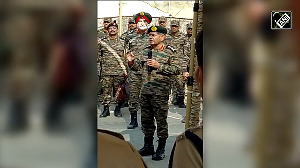Dr G Balachandran is one of India's foremost strategic analysts whose advice is regularly sought by the ministries of external affairs and defence.
An expert on nuclear energy, he conducted an in-depth study of US sanctions against India after the nuclear tests in Pokhran in May 1998. A visiting scholar at Pittsburgh's Carnegie Mellon University for two years, he spoke to Senior Editor Sheela Bhatt about Prime Minister Manmohan Singh's visit to America.
What do you think about the nuclear deal that India has got?
I may have some reservations about other elements of the Joint Statement but those two paragraphs of the Joint Statement on nuclear issues is the best deal that India could have got at any time.
Nuclear energy rules are very strict. They are not going to change the rules only because India wants so. No one is beholden to India. Other countries are not giving in because India does not have Full Scope Safeguards necessary to get technology. So, there has to be some give and take. Otherwise there would be no deal.
India needs a lot of energy. India does not have finance. The Nuclear Power Corporation of India doesn't have that kind of funds. Mostly, reactors come with credit as the Russians have given us in Kudankulam near Chennai. We have one type of reactors (pressurised heavy water reactors), now other types of reactors (light water reactors) can be imported. We need them if we want to increase our energy production.
Along with finance and reactors, we urgently need fuel for the Tarapur plant. For this the Nuclear Suppliers Group has to change it rules. The NSG will not change the rules only because India says I am a good guy. You can't jump the queue. So quid pro quo has to be done. As a result, India has to do a few things.
Can you discuss each of the major conditions mentioned in the Joint Statement?
The moratorium on nuclear testing has been mentioned as a major condition but India is already committed to it, unilaterally. Also, there is a condition regarding THE Fissile Material Cut Off Treaty. With regard to the FMCT we will have to follow it only when it comes before us. We have a long time on our hands.
Also, India will have to adhere to additional protocol for its civilian nuclear facilities. This is a negotiable part of the statement. It will depend on our bargaining power with the International Atomic Energy Agency. While finalising the terms, India can always bargain a better deal.
Another requirement is to place all the civilian nuclear facilities under IAEA safeguards. You can always put peaceful reactors under safeguards. It will not affect India's weapons programme. The Joint Statement does not specify which existing Indian reactors are for peaceful purposes and which are reserved for weapons programme. It is up to India to give the list of its civilian reactors.
Brajesh Mishra, the former national security advisor, has argued that the agreement with the US may cap the weapons programme in the long run.
What does he mean by a long run? Critics must specify that. There is no capping of the weapons programme. Look, India has not agreed to any external control over fissile material. The Dhruva reactor which produces plutonium, is not put under safeguards.
One can cap the weapons programme only if the supply of fissile material is controlled. India has not agreed to allow America any control over production of fissile material. The Indo-US agreement does not stop India from producing fissile material to make nuclear weapons.
In the past, America had stopped assisting the Tarapur plant when their own national priorities changed. Should India trust America again?
It was an agreement. They walked out and we didn't. Even in Tarapur, the Americans knew that they were in the wrong. That's why they arrange for French fuel. Nobody can be trusted. Americans can also ask -- can India be trusted?
See, the latest agreement in Washington is not to get nuclear reactors from America. This will help French and Russians to give us the reactors. How can you ask -- will Russians cheat us? Can the French be trusted? We don't need anything from Americans in this field. We want the Nuclear Suppliers Group guidelines to be changed.
Russians and French are ready to supply reactors we want but they are afraid because of these stringent guidelines. Indian critics have to understand that NSG will not change its rules until Americans agree.
What next? Would American lawmakers agree to President Bush's line? Strobe Talbott has already aired a dissenting view.
Talbott is unhappy because they (Clinton administration) wanted to cap India's programme. He says since the last seven years they were trying to accommodate India. He is annoyed because they wanted India to agree to have a moratorium on fissile production for weapon purposes which essentially means capping of the weapons programme.
The Bush administration has not asked for and India has not agreed to. Bush is after all a politician. [Undersecretary of State] Nicholas Burns has said that this matter has been discussed with the house leadership in Capitol Hill. In last week of June 2005, NSG members have met. I am sure America must have taken into confidence the key members of NSG about the deal with India.
Both sides will have to do certain things so that fuel for Tarapur will come first. Even American can ask you many things. The Joint Statement does not specify which are civilian and which are military facilities. Suppose, if India claims that four nuclear establishment which are already under IAEA are the only civilian facilities, then? I am sure both countries will work [through the] back-door and work out a schedule where both will work simultaneously on their home front.
India's unilateral announcement for moratorium on nuclear testing has now become a commitment.
We are not testing. What's the difficulty in giving a formal undertaking? Nobody in his right mind can say that India can afford to do a nuclear test and withstand sanctions.
I did a study in 1998 and had concluded that India will be able to withstand the sanctions. Today, I cannot say the same thing. Today India's economy is far more integrated with the global economy. In 1998 what did you have? How much foreign investment did we have? How much income did we have from outsourcing?
Now, we have high stakes. Of your own you cannot break the moratorium on testing. If somebody does it you can follow it, which any country will allow you. But you just cannot be the first one to start the series of testing. Since you are not in a position to do it, what is the harm in saying so?
On the issue of curbing of fissile material production, India says it will agree when it comes into effect. No one knows when that day will come. Since the last ten years it has been talked about. That's why Talbott is upset. Till then India can merrily produce fissile material. India has always maintained that for India, nuclear weapons are for 'minimum deterrent.' That also means there is an upper limit to nuclear weapons that we should have.
What are you going to do with extra fissile material? You can't use it for anything else.
I am sure the Americans must have asked for a moratorium on fissile material production. The Indian side must have said, 'In that case no deal is possible.'
It is a quantum change in India policy on the part of America. For many years they said no laws can be changed. Now, they are saying that laws can be changed. It is a dramatic change. Prime Minister Manmohan Singh has said he expects some of the things to get realised before Bush visits India. We have got a benchmark. The fuel for Tarapur can be expected before Bush's arrival.
What about using thorium for nuclear energy? It is said it will slow down research efforts on that front.
Oh, that is India's lifeline. We are not even at the beginning stage. Nobody is stopping India to go ahead. But that technology will take years.
A N Prasad, the former director of the Bhabha Atomic Research Centre, and many others have said it is impractical to separate military and civilian nuclear energy plants.
But it's not impossible. It's not a physical law that can prevent it. The cost of separation will have to be looked into. Nobody has done any estimate yet. There are some facilities in India that are engaged in both, civilian and military activities. What do you do with it? You can declare such facility as the strategic facility. There is nothing in the agreement which can stop you from using military reactors for civilian purposes.
In India we have 15 operating power reactors out of which four are under international safeguards. India will have to decide and declare out of the remaining 11 which are civilian energy producers.
Why could the National Democratic Alliance not cut this deal with the US while the United Progressive Alliance could?
Clinton would have never agreed to this deal. This is my conjuncture but I think Bush wanted to do something dramatic in his second term. I also believe Colin Powell would have also never agreed to it. But the presence of Condoleezza Rice made the difference.
In Washington only the State department officials were against India. But Rice managed them. The NDA government could not have got a better deal. The Leftists have no logical argument when they oppose the Indo-US deal. If Americans say the sun rises in the east they will oppose it and insist the sun rises in the west.
What reservations do you have about the deal?
None on the nuclear issue but I think the space sector has got nothing. India wants relaxation on export control on dual use items for the space industry. Our industry wants to launch a US-built satellite or satellite built with American components, in both cases we need permission from the US.
We need permission to launch satellites of other countries, which have American components. India's space sector is cheaper for many countries like say, Malaysia. The space sector has got nothing so far.
Which are the grey areas in implementing the deal?
Many. Next Steps in Strategic Partnership is incomplete but it is declared closed. That is an inaccurate statement of the deal. The high technology and space issues that were debated under it is in limbo.
In India, nuclear energy issue has many grey areas. There are many countries that can supply natural uranium to India and who are not members of the NSG. Why have we never contacted them? Nobody has stopped us. We were getting enriched uranium from China. Suddenly we stopped and moved to Russia. Then, Russia got into trouble and it affected us.
We have been able to survive because we are lucky and we have so many Gods to protect us!





